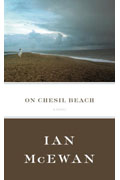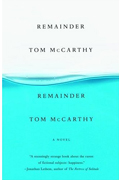
The Morning News Tournament of Books, sponsored by Powell’s Books, is an annual battle royale amongst the top novels in “literary fiction” published throughout the year. Read more about this year’s tournament »
» Buy the Books at Powells.com «
» Meet This Year’s Judges «
» Wager for Charity «
» Relive the Action: ’07, ’06, ’05 «
» Contact the Tournament Staff «
• ROUND ONE • MATCH SEVEN •
From the Booth
 |
On Chesil Beachby IAN McEWAN |

|
| v. | ||
Remainderby TOM McCARTHY |
commentary by KEVIN GUILFOILE & JOHN WARNER
KEVIN: Wow. We haven’t been talking about much about the mechanics of the tourney yet, but for the first time in Rooster tournament history, two no. 1 seeds have been knocked out in the first round. That no doubt speaks to the strength of the field as well as the really poor job we did of seeding these books, but either way it’s exciting, and I suspect this year’s Zombie Round, in which TMN reader favorites come back from the dead, could play a critical role this season.
The unintended consequences of reader expectations has become something of a theme of this year’s tourney, and I definitely think expectations hurt both McEwan and Ann Patchett. I have heard a lot of people say, for instance, that they liked Run a lot, “but it’s not as good as Bel Canto” (one of my favorite books of the last 10 years by the way) and then they immediately start telling me about a book that really surprised them.
I don’t think that most people value surprise in food. I think the majority of us want to know what something is going to taste like before we put it in our mouth, which is why McDonald’s and Starbucks and Applebee’s can be found in every city in America. (There is a hilarious commercial on the air right now in which a diner turns to his Olive Garden waitress and says, “I’m in the mood for something new,” words that have never been spoken to an Olive Garden waitress anywhere.) I don’t think we especially like surprise in music, either. The master playlist on most iPods is going to reveal a pretty narrow comfort zone, I suspect. Anyone who likes the White Stripes and also the Jack White produced Loretta Lynn album will say he has eclectic tastes.
But stories are different. The most elemental form of story is the joke, right? Which is 100 percent about surprise. Even the words “joke” and “surprise” are nearly synonymous. If I see you on the street and I say, “Holy crap, John, I have a great story to tell you,” it’s the same as saying, “You’re not going to believe this. You are going to be surprised when I tell this story to you.” A great story is a great surprise.
Now the counterargument to this is that the bestseller lists are filled with series books about the same characters getting into the same kind of scrapes over and over again. But those books generally only exist in genres—thriller and mystery—that are fundamentally about surprises. I enjoy a lot of series fiction myself because it’s a pleasure to return to characters you’ve grown fond of, but the essence of surprise is still preserved for the reader in these books.
Earlier you talked about the “box” of the celebrated debut novel. Maybe the reason that box is so coveted is that the debut novelist (a novelist like Tom McCarthy) has the biggest and best weapon of surprise, one that the McEwans and Patchetts of the world, even if they continue to turn out great novel after great novel, are no longer capable of wielding.
JOHN: The curse of being a popular novelist is indeed being held up against your own standards, which is why someone like T.C. Boyle or Joyce Carol Oates could ever receive a negative review. By comparison to themselves, they’ve produced some lesser and some greater books, but against some (admittedly mythical) objective standard, they’ve got to be batting close to 1.000.
My hunch is that the glamour and allure of the first-time novelist has always been prevalent in publishing, because there’s nothing like that big discovery, that first date where all things are possible. However, I wonder if the status of second novels hasn’t eroded a little too much, like the first novel is Brad Pitt and the second novel is Brad Pitt after a trip to the leper colony. If the next Cormac McCarthy came onto the scene today, you’d have to think his career in terms of publishing with a large commercial house would’ve been over long before he and Oprah could spend an hour together on camera. Ian McEwan took two or three novels to get the notice that turned into consistent sales. My old professor, Robert Olen Butler, won the Pulitzer for his seventh book.
This makes sense. The longer you do something the better you get at it, so it follows that Joshua Ferris’s fifth novel will be even better than his first. Of course, when your career gets as long and varied as Ian McEwan’s, you’re bound to have one that sings just a touch off-key, and the audience gets lured away by the sexy young upstart, which is why the seeding is rarely predictive of final results in our Tournament of Books.

» DOWNLOAD THE BRACKETS «
• Round One •
Tree of Smoke v. Ovenman
judged by Tobias Seamon
The Savage Detectives v. Let the Northern Lights Erase Your Name
judged by Elizabeth Kiem
Then We Came to the End v. Petropolis
judged by Anthony Doerr
You Don’t Love Me Yet v. New England White
judged by Jessica Francis Kane
Run v. Shining at the Bottom of the Sea
judged by Kate Schlegel
What the Dead Know v. The Brief Wondrous Life of Oscar Wao
judged by Elizabeth McCracken
On Chesil Beach v. Remainder
judged by Ze Frank
The Shadow Catcher v. An Arsonist’s Guide to Writers’ Homes in New England
judged by Helen DeWitt
• Round Two •
Tree of Smoke v. Let the Northern Lights Erase Your Name
judged by Mark Sarvas
Then We Came to the End v. You Don’t Love Me Yet
judged by Maud Newton
Shining at the Bottom of the Sea v. The Brief Wondrous Life of Oscar Wao
judged by Ted Genoways
Remainder v. The Shadow Catcher
judged by Mark Liberman
• SEMIFINALS •
Tree of Smoke v. Then We Came to the End
judged by Gary Shteyngart
The Brief Wondrous Life of Oscar Wao v. The Shadow Catcher
judged by Nick Hornby
• ZOMBIE ROUND •
Then We Came to the End v. Remainder
judged by Rosecrans Baldwin
The Brief Wondrous Life of Oscar Wao v. The Savage Detectives
judged by Andrew Womack
• FINAL ROUND •
Remainder v. The Brief Wondrous Life of Oscar Wao
All Judges + Jennifer Szalai